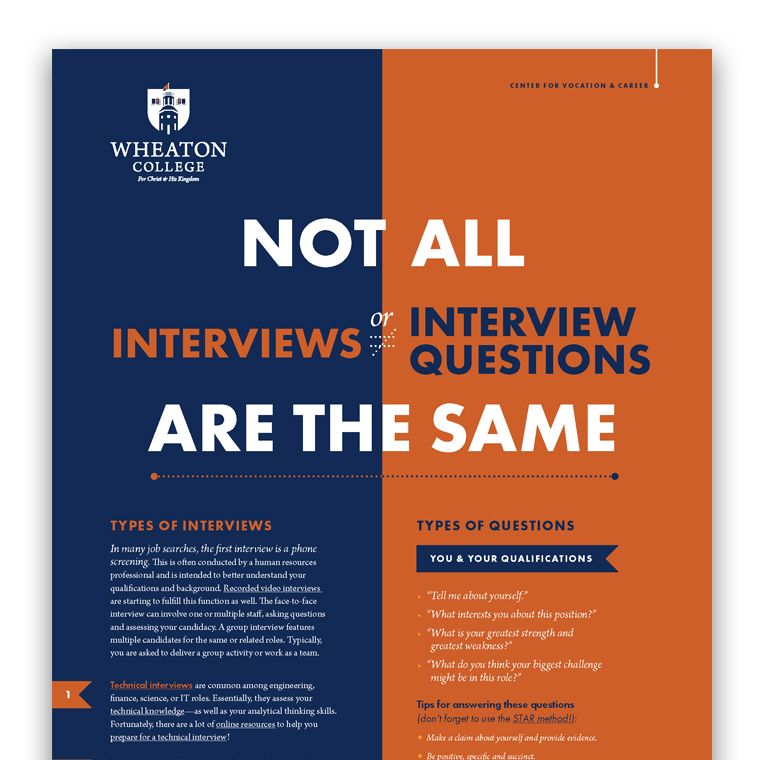Not all interviews or interview questions are the same. When you prepare for a variety of interview and question formats, you will feel confident in whatever interview situation you encounter.
Types of Interviews
In many job searches, the first interview is a phone screening. This is often conducted by a human resource professional and is intended to better understand your qualifications and background. Recorded video interviews are starting to fulfill this function as well. The face-to-face interview can involve one or multiple staff, asking questions and assessing your candidacy. A group interview features multiple candidates for the same or related roles. Typically, you are asked to deliver a group activity or work as a team.
Technical interviews are common among engineering, finance, science, or IT roles. Essentially, they assess your technical knowledge—as well as your analytical thinking skills. Fortunately, there are a lot of online resources to help you prepare for a technical interview!
In a case interview, common for some business and consulting roles, you will be presented with a challenging business scenario to investigate and propose a solution, something like ‘How many pianos are there in the Chicagoland area?’ The point is to see how you think – how you would go about answering the question. These take an extra amount of preparation, so plan on giving yourself time to get ready. We recommend starting with Case in Point, by Marc P. Cosentino.
With recorded video interview screening on the rise, Big Interview's mock interview simulator and playbooks prepare you for the unique interview challenges ahead. You can record your answers and get feedback from trusted advisors like your Career Coach.
Types of Interview Questions
You and Your Qualifications
- “Tell me about yourself.”
- “ What interests you about this position?”
- “ What is your greatest strength and greatest weakness?”
- “ What do you think your biggest challenge might be in this role?”
Tips for answering these questions (don’t forget to use the STAR method!):
- Make a claim about yourself and provide evidence.
- Be positive, specific and succinct.
- Try to limit your answer to two minutes at most.
Example: “I am interested in this role because I enjoy the problem-solving aspect of digital marketing. In my email marketing intern-ship last summer, my primary focus was to create interesting content and strategically schedule delivery to maximize the engagement of our target audience. By adjusting the length of our emails and varying our delivery times, we saw a 27% increase in our email engagement.”
Behavioral Questions
A behavioral question is a question that asks you to tell a story or give a specific example of something. In general, these questions focus on assessing your success skills, or career readiness competencies, like conflict resolution, leadership, teamwork, or career management. The parts of the story the interviewer is most interested in are the specifics of the situation you faced, action you took, and how it all turned out! Keep it specific, brief, positive and authentic.
- “Tell me a time when you led a project? Describe your approach to working with a team.”
- “Tell us about a time you had to change your approach to a project that wasn’t going well.”
- “Can you describe a situation in which you experienced conflict in the workplace and how you handled it?”
Example: “In my recent internship, I was in charge of migrating our data to a new Customer Relationship Management (CRM) system before the end of the summer—on top of handling my daily sales responsibilities. To meet our timeline and fulfill my sales responsibilities, I had to be very disciplined with my time management. I worked with my supervisor to plan out my schedule, and I blocked out three hours of focused CRM work time each day. During that time, I worked on transferring the data, cleaning out old contacts, and updating outdated information. As a result, the transfer was completed a week ahead of the deadline, giving me time to create a basic training guide for the new CRM.”
Scenario Questions
Similar to a case interview, scenario questions give you a hypothetical situation and ask what you would do in that situation. Scenario questions are a great opportunity to show off your critical thinking skills! Answer the questions thoughtfully, describing your desired outcome and approach to achieving it in challenging professional situations. Don’t be afraid to ask questions or/to get clarification!
- “What would you do if a subordinate or team member’s work was not up to expectations?”
- “How would you deal with a colleague at work with whom you seem to be unable to build a successful working relationship?”
- “You don’t have the information you need to prioritize your projects. Your co-workers and supervisor are unavailable for you to ask for guidance. How do you handle the situation?”
Gotcha Questions
These questions are designed to see how you think quickly, handle pressure or perform under duress. First and only rule: RELAX! You’ve got this! Do your best, and be authentic.
- “Describe yourself in one word.”
- “Sell me this pen.”
- “What are the last three books you’ve read?”
